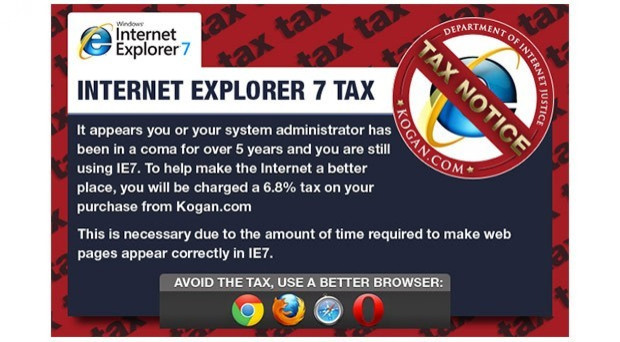Aussie Retailer To Microsoft: Where's My Home Page?

Did Microsoft Corporation (NYSE: MSFT) remove the home page of an Australian online retailer from its search engine Bing in retaliation for the company's campaign to urge people to stop using older versions of the Internet Explorer web browser?
No, says Microsoft, which issued this statement late Monday by email: The ranking of our results is done in automated manner through our algorithm, which can sometimes lead to unexpected results. We always work to maintain the integrity of our results to ensure that they are not editorialized; our results come from our algorithms not from humans.
But Ruslan Kogan, founder and CEO of the Australian online electronics retailer that bears his name, said his IT department noticed something peculiar on Sunday.
Web analytics is a big part to our business. We noticed this massive drop-off of traffic from Bing and Yahoo, Kogan said Monday by telephone, referring to Microsoft's search engine. Microsoft also has had a joint long-term partnership with Yahoo Inc. (NASDAQ: YHOO) that includes Bing powering some of Yahoo's search functions.
Kogan's monitoring of Web traffic underscores an important aspect of online retailing: learning how and why people visit a Web page. And when a retailer's home page drops suddenly from a search engine's results, it's important for the company to know that, and then figure out why.
A little context: In recent months Kogan has been pushing customers using older versions of Internet Explorer to upgrade or be charged a 6.8 percent IE7 tax on their purchases. Customers can easily avoid the extra fee by -- as the Web page states -- using a better browser.
A link at Kogan's site takes customers to the latest version of Internet Explorer. It also offers the option of downloading Microsoft's chief competitors in the browser war: Mozilla Foundation's Firefox and Google Inc's (NASDAQ: GOOG) Chrome. The better browser is left up to customers using Internet Explorer 7 or earlier to decide.
Kogan, the company, has said the motive for the campaign is economic: IT departments at major retail chains must spend time and money ensuring backwards compatibility of their e-commerce operations with older browser versions that cannot parse newer Internet technologies, such as HTML5.
The Down-Under online retailer has adopted an upbeat, humorous style in its corporate communications. In its blog post about the disappearance of its home page from Bing and Yahoo search results, Kogan depicts an image of magician David Copperfield in the place where the company's home page listing should be.
As of Monday, when you plug kogan or kogan.com into Bing or Yahoo, the company's main page is missing. Kogan's UK-based operation is prominently displayed on the first page of results, but, says Kogan: Our UK version is not charging the IE7 'tax', and therefore has no reference to it. The company's main Australian site is notably absent. The same query on other major search engines Google, Ask and AOL all deliver the company's main Australian home page as the top result.
We didn't mean to lash out at Microsoft. We love Microsoft. They're responsible for personal computing, said Kogan. But right now it looks pretty weird when you search for 'Kogan' on the Microsoft search engines. We're hoping it's just a bug or a fluke. We hope they're not doing anything like that.
By that, Kogan means removing companies from search results. While this would probably be considered within a company's First Amendment right it would also harm the brand's reputation for impartiality if it were believed to be editorializing its search results. This aversion to interfering with the algorithms -- the copyright-protected, carefully guarded trade-secret programming for ranking websites in search results using different factors, especially the popularity of a page in relation to the wording of a user's query -- is so strong that search engine providers have come out against recent legislative attempts to curb online copyright violations.
Industry advocates such as the Motion Picture Association of America have long said they would love to see the Googles and Bings of the world scrub media-piracy sites manually despite their popularity rankings based on the algorithms. The Stop Online Piracy Act, or SOPA, which is effectively dead, would have forced search engines to police their listings for copyright infringers. Forcing search providers to interfere with how their products determine the order by which websites are listed in search results -- or face penalties for allowing sites to appear that violate copyright laws -- was one reason why the giants of the web strongly opposed SOPA.
© Copyright IBTimes 2024. All rights reserved.






















